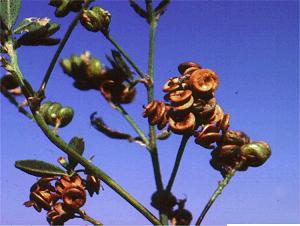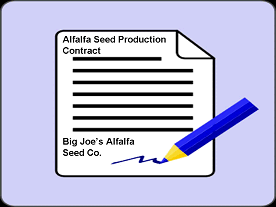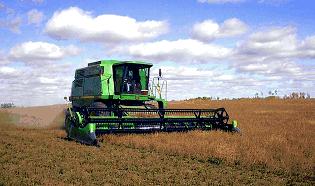| | Introduction | Canadian industry | World production | Marketing alternatives | Summary | Return to Special Commodity Marketing page
,
Introduction
Alfalfa is used widely throughout the world as a source of high protein roughage for livestock in pasture and hay mixes. In Canada, alfalfa is regarded as the “Queen” of forages, and is a major component of Canada's processed forage industry (dehy alfalfa sector). It is used extensively as a high quality feed in the dairy industry. As a result, alfalfa seed production is a major crop in various regions of Canada. Canadian production also allows Canada to be a major exporter of alfalfa seed, with alfalfa seed produced almost entirely in Alberta, Saskatchewan, and Manitoba. Canadian alfalfa imports can also be significant, with large quantities destined for Ontario and Quebec. The primary supplier here is the United States.
Canadian Industry
The alfalfa seed industry in Canada underwent considerable change during the 1990’s. The most notable changes were an increase in acreage, for both pedigreed varieties and common seed. An increased interest in proprietary (private alfalfa varieties) has also taken place. Alfalfa seed acre expansion occurred in Manitoba and Saskatchewan. The trend to greater use of private alfalfa seed varieties by both farmers and consumers is expected to continue in the foreseeable future.

World Production
North America is the largest alfalfa seed producing region with Canada and the United States together producing over 100 million lbs of alfalfa seed in a normal year. In the United States, production occurs primarily in California (non-dormant varieties), Idaho, Washington and Nevada. Other important alfalfa seed growing regions of the world include France, Italy and Argentina.
Canadian Alfalfa Seed Exports
The vast majority of Canadian alfalfa seed ends up being exported out of country, primarily to the USA. Many of these export sales are previously arranged contract seed production back to American grass/legume seed companies. The USA accounts for approximately 50% of Canadian alfalfa seed exports, with China, the destination for another 35%. The remainders of Canadian exports are spread throughout the world
| Canadian Alfalfa Seed Exports by Crop Year |
 | Kgs. (millions) |
 | 2010 | 2011 | 2012 | 2013 | 2014 |
| Total (World) | 11.2 | 9.9 | 9.9 | 12.7 | 14.0 |
| United States | 6.1 | 2.1 | 5.2 | 6.3 | 6.8 |
| China | 4.2 | 3.2 | 3.4 | 4.5 | 5.0 |
| Netherlands | 0.17 | 0.30 | 0.60 | 0.65 | 0.72 |
| Argentina | 0.2 | 0.45 | 0.15 | 0.10 | 0.30 |
| Italy | 0.27 | 0.12 | - | 0.17 | 0.25 |
| Germany | - | 0.10 | 0.23 | 0.20 | 0.17 |
| Denmark | - | 0.04 | 0.03 | 0.28 | 0.16 |
| Other Countries | 0.22 | 0.52 | 0.24 | 0.43 | 0.56 |
| Canadian Alfalfa Seed Imports by Crop Year |
 |  | Kgs. (millions) |
 |  | 2010 | 2011 | 2012 | 2013 | 2014 |
| Total: |  | 2.07 | 1.71 | 1.39 | 1.30 | 1.66 |
| United States |  | 1.10 | 1.24 | 0.72 | 0.98 | 1.10 |
| Australia |  | 0.58 | 0.08 | 0.02 | 0.16 | 0.40 |
| Italy |  | 0.21 | 0.07 | 0.33 | 0.11 | 0.02 |
| Other Countries |  | 0.18 | 0.27 | 0.28 | 0.05 | 0.04 |
Marketing Alternatives
| Farmers can market alfalfa seed in several ways. The simplest method is selling into the cash market through a processor or seed company. This is convenient if large quantities of seed is involved. Seed companies offer to purchase seed in the marketplace at a “wholesale” price, based on their knowledge of what the product can be sold for. Prices offered vary, depending on supply/demand conditions (how these conditions are perceived by the firm.) |  |  |
For growers, the cash market has both advantages and disadvantages. Daily price offerings mean that their production can be turned into cash on short notice. With several companies making offers, the best daily price can be obtained after making a few phone calls. The grower assumes all the price risk but maintains maximum flexibility in terms of when to sell and how much seed to sell. One negative aspect of marketing seed in this manner is that the farmer bears a tremendous amount of price risk. Alfalfa seed markets will fluctuate with basic supply and demand market principles. The ability of the farm operation to withstand this level of risk will vary between farms. Many growers who market this way are prepared to store their seed when prices are unacceptably low and wait for prices to improve.
It has become increasingly common for farmers to contract their alfalfa seed production. Most contracts available are production types, whereby the farmer agrees to grow and sell all, or some portion of the alfalfa seed produced from a specified area of land. With alfalfa being perennial in nature, many new contracts are negotiated for a set minimum period of time (e.g.: 3 years). These contracts may be priced or un-priced. Priced contracts may be written at a fixed price, or written as an initial payment with a possible final payment in the future, (after the seed has been sold by the company). With un-priced contracts, the farmer agrees to deliver the stated quantity of alfalfa seed, with the price received determined at the time of delivery. For example, the price may be the cash bid on the day of delivery, or could be based on an average price for a particular public variety over some predetermined period close to when the seed is delivered. Production contracts generally have an "Act of God" clause, meaning that in the event of a crop failure, the farmer's obligation to deliver seed is removed. Priced contracts are common for farmers growing proprietary varieties from the United States. These contracts will often specify a price per pound for one year, with subsequent year’s price renegotiated.
Deferred delivery contracts are another contracting option for producers. These are similar to production contracts in some aspects but differ in that the amounts specified in the contract for Delivery is a legal obligation. Failure to deliver could result in legal action by the seed company.
Another marketing option is for farmers to use a broker to sell their alfalfa seed. In Alberta, there are a number of seed companies that will perform brokerage functions for farmers. In most cases, alfalfa seed must first be cleaned, bagged and tested (germination and purity).
Growers can also directly retail their own seed. Seed is cleaned, bagged and tests conducted at the growers expense. Generally, these private sales involve relatively small volumes of public certified or common seed. Private proprietary varieties are generally not sold in this manner.
Unlike other forage grass and legume varieties, there is generally good demand annually for alfalfa seed.
, |  |  |
Summary
Alfalfa seed can be marketed in a variety of ways:
- Growers can sell into the cash market to a seed company or processor, or contract their expected production with a seed company.
A production contract can be entered.
- For quantity only or
- Have a contracted (set) price for the production of the seed. . Contracting can reduce some or all of the price risk, but in most cases it will take away the potential for gains if markets strengthen.
- Growers also have the option of selling their own seed, or
- Sell their own seed through a broker. The best choice for growers will depend to a great extent on their willingness and ability to accept risk.
Remember, every company and contract may be different. Contracts are legally binding documents. Guidelines for dockage, germination, and grade may vary between companies, as will discounts. Producers must know what they are signing and the obligations and responsibilities of each party to the agreement. |
|